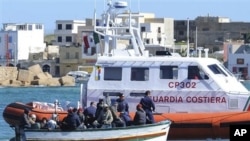Residents of the tiny southern Italian island of Lampedusa are bracing for an influx of refugees fleeing political violence in North Africa. Island officials and business leaders are concerned the mass migration could adversely affect the tourism industry.
More than 6,000 immigrants have already landed in Lampedusa since the start of the year. Mayor Bernardino De Rubeis, like the population, knows that tourism, the island’s livelihood, could be at risk.
Mayor De Rubeis says Lampedusa is a land of reception, door to Europe, a land of tourism and fishing. He adds that the island residents want to be identified in this way, knowing that immigration will continue. But, he insists, the territory must live off tourism and this is the concern of the population.
Lampedusa island residents are accustomed to the arrivals of immigrants and have opened their doors to people in search for a better future. But they very aware the number of arrivals from North Africa, where political violence has forced many to flee, could be unprecedented.
Local hoteliers and restaurant-owners say there is serious concern about the upcoming tourist season. Antonio Martello owns more than one hotel on the island and is a tour operator.
Martello says he and other hoteliers thought they would have a good season but the number of arrivals to the island has dramatically increased. He says this has led to major problems because the bookings they had been receiving were all put on stand-by. He adds that now they do not know whether these room reservations will be reconfirmed, if the situation is not resolved.
Many Lampedusa residents say they feel a moral duty to help people fleeing political violence. But they say the Italian government and other European nations must take concrete measures to deal with this problem.
Hotel owner Antonio Martello says refugees must be helped in their own country. The international community, he says, must go to them and help them with employment projects, projects that can help them find work. He adds that aid must be taken to the refugees because it is unthinkable that all them can be hosted in Italy and elsewhere in Europe.
The European Union dispatched a fact-finding mission to the Libyan capital, Tripoli, on Sunday. The international mission, the first since the recent violence erupted, is charged with reporting back on humanitarian and evacuation needs there to an E.U. crisis summit on Libya to be held in Brussels next week.
Tiny Italian Island Braces for Influx of North African Refugees




